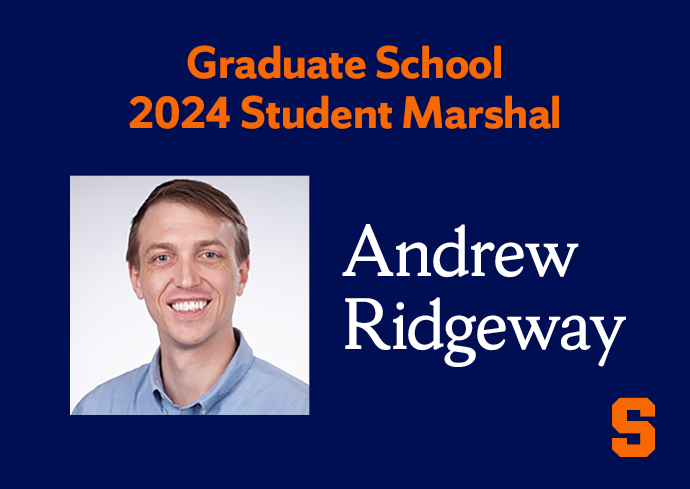
Graduate School marshal Andrew Ridgeway, a doctoral student and graduate teaching assistant in the College of Arts and Sciences’ composition and cultural rhetoric program (CCR), is no stranger to academic honors. In 2022, he won the prestigious Mary Hatch Marshall Essay Award and was one of nine graduate students to receive the Graduate Dean’s Award for Excellence in Research and Creative Work.
Ridgeway has also served as graduate research assistant for the Engaged Humanities Network (EHN) and received a $10,000 grant from Humanities New York to help high school students at the North Side Learning Center create a speech and debate team. Those students went on to successfully compete in public forum debate tournaments, Model United Nations and New York State History Day.
A native of Boise, Idaho, Ridgeway received a bachelor’s degree in English literature from Boise State University and a master’s degree in literature from the University of Vermont. He says he chose Syracuse University for doctoral studies because of the unique community engagement emphasis of the composition and cultural rhetoric program.
Ridgeway recently discussed his experiences here, his passion for community-engaged scholarship and his plans after graduation.
Syracuse has one of the best composition programs in the country and it has a really unique record of students and faculty doing public–facing research work. When I visited, every faculty member I spoke to could draw a line from their research to a project in the community. I was really impressed at the extent to which research and scholarship is tied to practical applications. Public humanities projects appeal to me and I wanted to be part of the work people in my department do to serve their communities. The CCR program really puts that community-facing work front and center.
The intellectual freedom and the extent of support that I’ve received for the kind of work I’ve wanted to do. I’ve had full support and encouragement for my ideas and that has opened doors for me, truly enriching my experience.
My focus blends digital rhetoric and classical rhetoric to examine how misinformation and conspiracy theories circulate on social media. That’s not a combination most people would think of but I’m really fortunate that I found a community of people who have encouraged me to pursue that.
What I love about rhetoric more generally is that it’s so open-ended and there is so much room to explore, yet it also incorporates ideas from 2,000 years ago. Anything can be rhetorical, so I’m always finding new things to write about.
Andrew Ridgeway
Brice Nordquist [associate professor of writing studies, rhetoric and composition, Dean’s Professor of Community Engagement and EHN founder and director] works very hard to create connections and opportunities for graduate students, faculty and members of the Syracuse community. Brice taught me the importance of having a participatory model of community-driven humanities engagement. The emphasis always has to be on creating a mutually beneficial partnership between the community and the University, where both are bringing different resources and knowledge to the table.
My EHN work with the speech and debate team at the North Side Learning Center was an incredible learning experience for me because the students set the agenda, ran the meetings and made the hiring decisions. They did a lot of the recruiting, too. I handled the administrative stuff and helped them with their speeches, but it was their team from the beginning. I’m really honored they approached me and invited me to be part of that project.
I know that I want my career to be in academia. I’m applying for a range of positions, including postdoctoral roles, assistant professor positions and director of writing center positions. There are lots of different avenues for this type of degree. I’m a person who has always been interested in everything, so the hard part will be choosing.
It’s hard to put it into words.
I think of Syracuse as a community that I’m part of, that I care about and am invested in, and I want it to succeed. I’m so honored that my work is being recognized by the community in this way, and I’m also humbled because there are so many graduate students who are doing incredible work at Syracuse. I’m just blown away by their projects and the quality of their research. The things my colleagues are doing are going to make a huge difference in the world. So, when I see all the incredible work they’re doing, being selected class marshal is a huge and unexpected honor.
On March 27 there was energy in the air for Syracuse University’s 2024 Giving Day. This year, for the first time, Hendricks Chapel partnered with the Office of Fraternity and Sorority Affairs and the Interfraternity Council to gather support for…
The Mayor of Florence, Italy, Dario Nardella, will deliver Syracuse University’s 2024 Commencement address Sunday, May 12, in the JMA Wireless Dome. The ceremony will begin at 9:30 a.m. Nardella was first elected in 2014 and is currently serving his…
Syracuse University Libraries recently signed its 12th ‘read and publish’ open access agreement, this time with major academic publisher Springer, expanding the reach of researchers’ scholarly contributions by enabling all University-affiliated authors the ability to publish their work open access in…
Natalie Koch, professor of geography and the environment in the Maxwell School of Citizenship and Public Affairs, recently gave an address for the State of Arizona Research Library’s 2024 Arizona Author Series on connections between desert agriculture in the Southwest…
Graduate-level learning, research and creative activities take place in classrooms, labs and studios on the Syracuse University campus, but they also occur throughout the community as graduate students work with local residents of all ages and backgrounds through partnerships with…
If you need help with your subscription, contact sunews@syr.edu.

Recent Comments